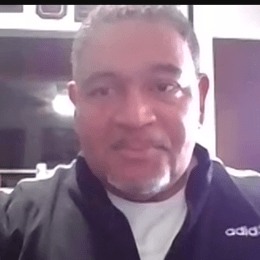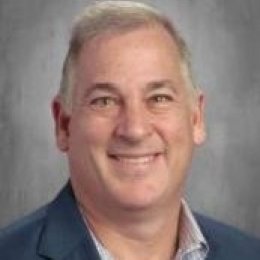
Mental Health Counseling
- 60 Credits
- School of Social and Behavioral Sciences
- Bronx
- Westchester

Mental Health Counseling Program Overview
Mental health counselors are a vital resource for individuals and families, and help communities thrive.
Our Mental Health Counseling program qualifies graduates to sit for the New York state professional licensing exam, and to seek initial employment towards meeting the 3,000-hour supervised experience required for licensure.
Your practicum and internship experiences will allow you to focus on specific types of counseling.

Career Opportunities
Mental health counselors work in settings including:
- Family services
- Outpatient centers
- Hospitals
- Government
- Private practice
- Substance Disorders Programs
- Community Agencies
Join us for our Upcoming Graduate Events
Join us for an upcoming graduate admissions event to learn more about our Mental Health Counseling program and explore how Mercy can help you meet your goals.
Why Study Clinical Mental Health Counseling at Mercy University?
25% Growth
Career Outcomes
Job growth is more than four times faster than the national average for all professions.*
*U.S. Bureau of Labor Statistics
Flexible Options Available
Part-time and full-time study available. Day and evening classes can be taken at the Dobbs Ferry or Bronx campuses in NY, and some classes are also offered online.
60 Credits
Total Credits to Earn Your Degree
Classes in counseling and ethics, trauma and crisis, family assessment, research methods & diagnosis and treatment
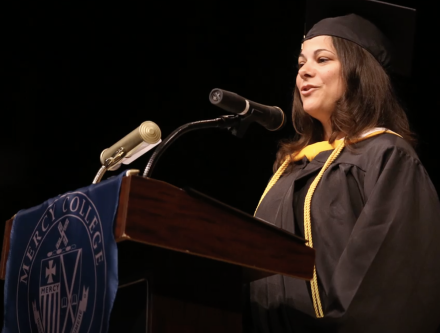
Degree Requirements
- Successful completion of 60 graduate credits for Mental Health Counseling with a 3.0 cumulative GPA
- 700 hours of fieldwork required
- Successful completion of a written comprehensive examination (CPCE)
Outside The Classroom
Fieldwork involves two components: summer practicum and a full year of internship. This fieldwork allows graduates to put their classroom learning into practice. We have strong relationships with clinics and other agencies in the greater New York area, ensuring that graduates are prepared with clinical experience and professional contacts.
Want More Info?
We'd like to hear from you! Get more information.

Advance Your Mental Health Career - Debt Free
As the demand for mental health professionals continues to grow, Mercy's Mental Health Counseling program and the Career Pathways Training (CPT) program in partnership with New York State and the 1199 SEIU Union, offers full-time students beginning in summer or fall 2025 the unique opportunity to advance their education and career — at no cost.
Eligible students will receive financial assistance covering 100% of tuition, training, books and more, while also gaining access to job placement assistance and other invaluable resources.
Take the next step in your journey as a mental health counselor with no financial burden holding you back.
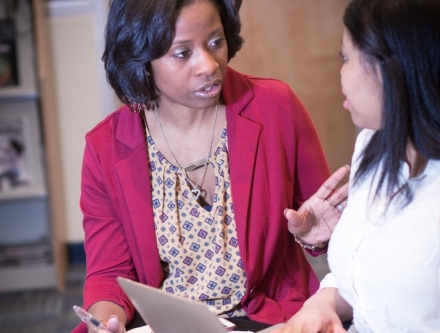
CASAC-T Certification
Students can also pursue a CASAC-T Credential through the Office of Alcoholism and Substance Abuse Services (OASAS) while they work on their mental health counseling degree in NYC.
This credential allows students to be certified and paves the way for both direct patient care and supervisory positions in the area of substance abuse and addiction. As a Certified Alcoholism and Substance Abuse Counselor Trainee (CASAC-T), students complete an additional 350 hours of training in the Addiction Specific Standardized Curriculum.
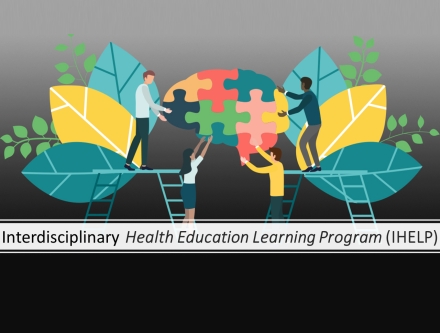
IHELP at Mercy University
Mercy University is here to help our students and communities succeed. The new Interdisciplinary Health Education Learning Program (IHELP) fellowship aims to expand internship opportunities that provide services for children, adolescents, and transitional-aged youth who are at risk for behavioral health disorders in high need and high demand areas for graduate Fellows in Mercy's School Counseling, Mental Health Counseling, Marriage and Family Therapy, or Occupational Therapy programs.
Admissions Requirements
- To be considered for our programs for mental health counseling, applicants should provide:
- An official baccalaureate degree with a GPA of at least 3.00. We will evaluate applicants with a lower GPA for provisional acceptance.
- Two letters of recommendation from degree-specific instructors or industry professionals.
- NOTE: At least one letter must come from a professor. At this time, we cannot accept references from personal contacts, including friends, relatives, personal counselors or professionals outside the counseling field.
- A current résumé
- An 800-1,000-word personal statement that addresses these questions:
- What does it mean to be a mental health counselor?
- What influenced you to want to be a mental health counselor?
- What are your three biggest strengths? Your three biggest challenges? How will your strengths and challenges impact you as a student in the mental health counseling program and as a future mental health counselor? If your GPA is below a 3.0, this must be one of your challenges that you discuss.
- What influenced you to apply to Mercy University?
At Mercy University, we aim to help anyone learn how to become a therapist in New York and beyond. Should you have to leave your program for any reason, you can return using an abridged application:
- Students who take leave for three semesters or less should resubmit their transcript and essay only.
- Students who take leave for two years should resubmit their transcript, essay and résumé.
- Students who take leave for three years should resubmit their transcript, essay, résumé and one updated recommendation letter.
- Students taking leave for four or more years must resubmit their entire application.
Frequently Asked Questions
Fulfill partial requirements for licensure as a Mental Health Counselor. The 60-credit course of study prepares you for licensure in counseling at public and private agencies or in private practice. The Master of Science in Mental Health Counseling is a licensure-qualifying 60-credit program. Graduates are eligible to seek initial employment towards meeting the 3,000-hour externship required for licensure as a mental health counselor in New York State.
Admission to the graduate program requires:
- Two professional letters of recommendation,
- A two to three page essay stating the applicant's reason(s) for pursuing a degree in counseling
- A resume
- Completion of a baccalaureate degree or its equivalent from an approved institution
- An undergraduate cumulative GPA of 3.0 or above (on a 4.0 scale), including grades of B or better in one three-credit mathematics or statistics course.
If you do not meet all these requirements you may be admitted on a provisional basis until you have fulfilled the prerequisites or (in the case of GPA), demonstrated your ability to do adequate graduate-level work. You must complete the prerequisites within the first two semesters (or nine credits) of study. Master's Degree in Counseling or a Master's Degree in Mental Health Counseling.
Certification and licensure are not the same. Certification is done by specific certifying bodies, such as the National Board of Certified Counselors (NBCC). Licensure is established by individual states.
Ultimately, the decision to become a CASAC is a personal one. The work can be challenging and test your limits, but it can also be incredibly rewarding for the right people. If you relate to these statements, you may be a good candidate for CASAC-T certification:
- You want to specifically work with individuals dealing with addiction and substance abuse.
- You're interested in a more challenging workload.
- You want to expand the services you are able to offer.
To become a CASAC, you must:
- Have at least a GED or high school diploma
- Complete 350 hours of education in the Addiction Specific Standardized Curriculum
- Have 6,000 hours of work experience or a degree like Mercy University's Mental Health Counseling program with equivalent field experience
- Complete three Ethical Conduct Forms and Evaluations of Competency
- Pass the IC&RC AOD examination
Mercy University's Mental Health Counseling degree program in NYC meets all the education requirements for licensed professional counselors. Graduates will also need to meet:
- Experience requirements: Aspiring counselors must prove they have completed at least 3,000 hours of mental health counseling in an approved setting. This experience must include at least 1,500 hours of direct patient contact. Trainees should also gain experience in research, case management and other administrative tasks. Note that field experience is only applicable to this requirement following your successful completion of a mental health counseling program.
- Examination requirements: Counselors must pass the National Clinical Mental Health Counselor Examination (NCMHCE) before they can legally practice. Once students graduate from our program, they will be eligible to take the exam.
Program Details & Curriculum
The 60-credit Master of Science Degree Program in Mental Health Counseling is organized as follows:
Level I: 18 Credits
Basic Foundational Knowledge, Theories and Skills
Level II: 27 Credits
Intermediate Pre-Internship Prep., Social Basis of Behavior and Assessment
Level III: 15 Credits
Advanced Specialty Concentration and Internship
Total: 60 Credits
Download a copy of the sequence map for:
- 2024 - 2025 M.S. Mental Health Counseling - 4 Year
- 2024 - 2025 M.S. Mental Health Counseling - 3 Year
Archive
- 2023 - 2024 M.S. Mental Health Counseling - 4 Year
- 2023 - 2024 M.S. Mental Health Counseling - 3 Year
- 2022 - 2023 M.S. Mental Health Counseling - 4 Year
- 2022 - 2023 M.S. Mental Health Counseling - 3 Year
- 2021 -2022 M.S. Mental Health Counseling - 3.5 Year
- 2021 - 2022 M.S. Mental Health Counseling - 3 Year
- 2021 - 2022 M.S. Mental Health Counseling - 2.5 Year
- 2020 - 2021 M.S. Mental Health Counseling - 3.5 Year
2020 - 2021 M.S. Mental Health Counseling - 2.5 Year
Full-Time Faculty
Carolyn T Cullen
- MaH Cottage
- ccullen@mercy.edu
- (914) 674-7745
Shakuntala M Ramdas
- BX 2256
- sramdas@mercy.edu
- (718) 678-8824
Angelle Elaine Richardson
Kay M Vitro
- Mahoney Hall, Rm. 210
- kvitro@mercy.edu
- (914) 888-5329
Part-Time Faculty
Dennis C Andrews
- MaH Cottage
- dandrews1@mercy.edu
- (914) 888-5346



